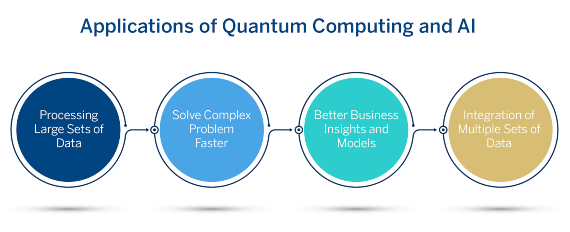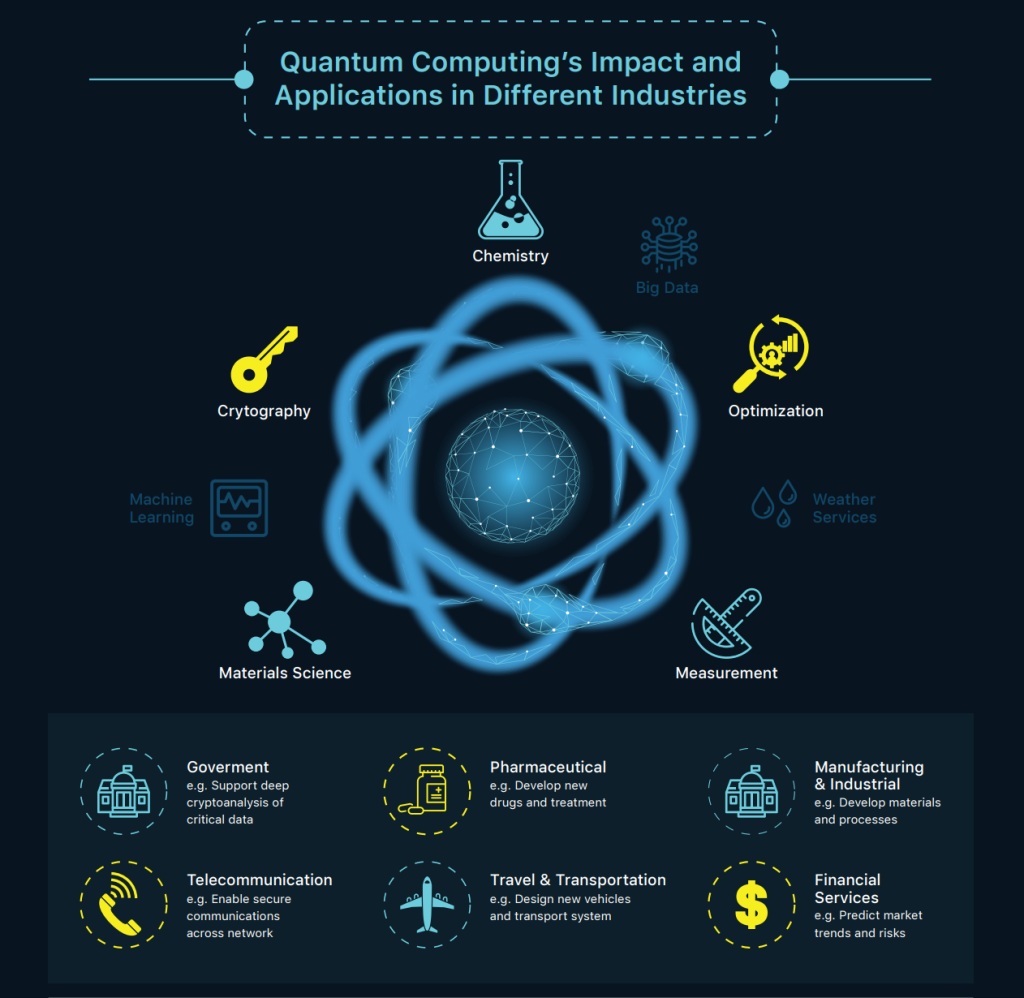Quantum computing has great potential to revolutionize AI. As we know, Artificial intelligence is already changing the world in ever-increasing ways. With the arrival of Quantum computing, this impact will increase even more. Large companies such as Honeywell, Microsoft, IBM, and Google have sponsored this technology to produce numerous inventions and breakthroughs. What does quantum computing mean, and how will it advance AI? Let’s explore this in more detail in this blog
Also read: How Artificial Intelligence Is Revolutionizing The Aeronautics Industry?
Quantum Computing: What Is It?
A whole different approach to understanding the world around us is through quantum computing. It does not merely concentrate on atoms and molecules’ characteristics. It examines the subatomic characteristics of atoms that are, in actuality, superposed. They are simultaneously present in various states. Subatomic particles can exist simultaneously as waves and particles, thanks to one of the fundamental ideas of quantum physics.
Data is typically encoded as bits, which can only be 1 or 0. Qubits can simultaneously be 1 and 0 in quantum computing due to the superposition phenomenon. Quantum computing has excellent power and can perform several calculations simultaneously. And that’s why it is also called the future of data science and artificial intelligence. If we believe Business Insider’s reports, then Quantum computing is indeed the future of computing. Let’s have a look at the following stats of Business Insider:

- Quantum computers process information at a rate that is millions of times faster than traditional computers. Quantum AI refers to the application of quantum computing to the processing of machine learning algorithms. Due to the processing capabilities of quantum computing, quantum AI can assist in achieving results that are not attainable with conventional computers.
- Although artificial intelligence has made remarkable advancements over the past ten years, it still faces technical limitations. It is possible to achieve AGI (Artificial General Intelligence) because of the unique properties of quantum computing.
- Machine learning models can be trained quickly with quantum computing, and more effective algorithms can be created.
- Thanks to quantum computing, a robust and optimized AI that can complete years of analysis quickly can lead to technological advances.
- Reasoning under ambiguity, flexible machine learning, and neuromorphic cognitive models are some of the critical problems with modern AI. The best option to beat them is quantum AI.
- By 2030, the market for quantum computing is expected to reach a value of $64.98 billion.
- Industry giants like Microsoft, Google, and Intel are fighting for the top spot in creating quantum computing tools.
The Use Cases Of Quantum AI
Using quantum computing to calculate machine learning algorithms is known as “quantum AI.” It uses the computational power of quantum computing to accomplish impossible results with regular computers. The following are some of the most significant uses of this super-combination of artificial intelligence and quantum computing.
1. Solving Complex Problems Quickly: The size and complexity of datasets are increasing beyond the capabilities of our current computer. Consequently, we face lots of problems in our computing architecture. These issues are difficult or impossible to solve for most existing computers. Quantum computing, however, may be able to solve these problems within minutes. Currently, quantum computing is in its infancy. While quantum computing is still relatively new, it is believed to have a positive impact on artificial intelligence, most notably machine learning.
2. Processing Large Datasets: It is possible to process large volumes of data with quantum computers. The quantum error correction code has recently been improved, making it easier to control quantum bits’ capacity with each new iteration of quantum computers. People are also able to make better commercial decisions thanks to quantum computing.
3. Assisting IT Operations: Have you ever wondered where our computer systems are weak? What is the best time to upgrade our hardware or software? Is there a way we can respond to incidents more quickly? What is the percentage of our time we spend doing activities that can be automated? It is only through extensive data analysis that these ITOps questions can be answered. With quantum computing, AI queries can provide real-time visibility into operational data.
4. Detecting Fraud: The detection and prevention of fraud can be improved using AI and quantum computing in the finance sector. On the one hand, models trained on quantum computers can identify challenging patterns using standard technology. Additionally, the amount of data that the machines might handle for this purpose would greatly benefit from the speeding up of algorithms.
5. Improving Business Insights And Models: Globally, numerous businesses are cutting their ties with conventional computer rope as the volume of data generated in industries like medical science, banking, and pharmaceuticals rises. In the modern era, businesses need complex models with the processing ability to simulate the most challenging scenarios to have a more robust data framework.
Here, Quantum computers can help companies significantly. Better models for diseases in the healthcare industry will be developed using quantum technology, such as the COVID-19 research cycle, which entails diagnosing, tracking down, and treating the infection. Additionally, it will help prevent financial collapse in the banking industry and strengthen the supply chain in the industrial sector.
6. Integrating Data From Different Datasets: When quantum computers are made available, significant advancements are anticipated because of the integration of highly diverse data sets. Without human input, this might not be easy initially, but human information will help computers learn how to integrate data in the long run.
Because each raw data source has its schema (verbiage and column headings), a computer would need to comprehend the relationship between the schemas before a research team could compare the data. To do this, advancements in the most challenging area of artificial intelligence—understanding natural language semantics—are necessary. On the other hand, feedback from people can help the system be trained for the future.
Our ability to develop machine learning and artificial intelligence will be improved and transformed due to quantum computers’ promise to accelerate the processing and integration of our enormous data sets.
7. Enhancing DevOps: DevOps teams can use quantum computing and artificial intelligence to set business objectives and priorities, create novel software solutions, and oversee the ongoing maintenance and testing of already-existing systems. DevOps teams can leverage AI data to support testing for regression, functionality, and user acceptance. Testing can be more thorough and consistent because quantum computing enables AI to process data from diverse sources (such as different, siloed units of a vast organization).
What Are The Significant Advantages Of Quantum Computing For Artificial Intelligence?
Quantum Computing is a thousand times faster and more potent than conventional computers. That’s the reason they can manage issues considerably more rapidly and accurately. The creation of ‘deep learning’ algorithms is one example of how quantum computing can be used in AI. By ‘training’ on smaller pre-processed data sets, these algorithms can learn to recognize patterns in big data sets.
Deep learning algorithms are very good at identifying objects, faces, and other types of photos, but they might be much better at identifying objects in the real world. AI systems might perform better in virtual and real-world environments if quantum computers could be employed to enhance deep learning algorithms.
Here, we have some more advantages of Quantum computing for Artificial Intelligence:
- Increasing the rate of machine learning model creation.
- Helping in the naming and categorization of medical photographs.
- Helping to advance autonomous car technology.
- Enabling improved security features for online accounts on social networking networks.
Must read: Explore The Potential Of AI And IoT Technologies In The Business Sectors
How Will Quantum Computing Change AI?
In the fast and forwarding world, Artificial intelligence is taking over as the main force to rule the world of technology. It is believed that in the near future, machines powered by artificial intelligence will be able to perform tasks beyond their human counterparts’ capabilities. One recent advancement in AI is quantum computing, which has attracted much attention for study and development.
A significant amount of progress has also been made in artificial intelligence during the previous few years. It can create lifelike 3D images and films. The acceptance of quantum computing has begun. That gave rise to quantum AI. Nowadays, quantum computers are used in artificial intelligence. Their full integration will lead to the technological revolution of the century.
Top Companies Working In Quantum Computing For Artificial Intelligence
Many companies are working on integrating quantum computers for machine learning and artificial intelligence (AI). Let’s know the leading companies in this industry for innovation and development are:
- Google: Google has made tremendous advancements in the design of quantum hardware and software and has been at the forefront of quantum computing research. Additionally, the business has looked into applying quantum computing to machine learning and other AI applications.
- IBM: IBM has a long history of quantum computing research and has created various hardware and software solutions in the field. The business has also been experimenting with using quantum computers for AI functions like machine learning.
- Microsoft:Microsoft has been working on building quantum computers and has produced a quantum development kit that enables programmers to build quantum algorithms and evaluate them on conventional computing platforms.
- D-Wave Systems: A pioneer in developing quantum computers, D-Wave has made several quantum computing products available. The business has also focused on machine learning and optimization issues using quantum computers.
- Rigetti Computing: In its early stages, the startup business Rigetti has produced several quantum hardware and software items. Additionally, the company has looked into applying quantum computing to machine learning and other AI applications. These are just a few businesses developing quantum computing for artificial intelligence and machine learning. Many academic research groups and startups are also actively involved in this field.
New Advances In Quantum Computing
Photonic integrated circuits with effective control over photonic quantum states, or qubits, are essential for successfully using quantum technology. The Helmholtz-Zentrum Dresden-Rossendorf (HZDR), the Technical University of Dresden (TU Dresden), and the Leibniz-Institut für Kristallzüchtung (IKZ) have made considerable advancements in solving this problem. The controlled synthesis of silicon nanoscale single-photon emitters has been realized. The scientists stated the following in their report published on December 12th, 2022, in Nature Communications:

Previous attempts to develop single-photon emitters were hindered by their inability to scale up due to their uncontrolled generation in random areas. Through the use of focused ion beams (FIB), it is quite likely that individual G and W centers on silicon wafers can now be produced in a controllable manner. Additionally, using broad beams, a precise single telecom emitter implantation strategy on the nanoscale has been established, aligned with complementary-metal-oxide-semiconductor (CMOS) technology. These findings offer a simple method for producing industrial-scale photonic quantum processors with technology nodes smaller than 100 nm. This study provides a simple and helpful roadmap for creating such processors.
Wrapping Up
Quantum computing has many potential uses, which are gaining ground quickly. However, this technology’s prospective effects on artificial intelligence have received little attention. In addition to modeling complex systems and molecules, quantum computers are substantially faster than traditional computers at decoding problems. Quantum computing will be essential to advancing artificial intelligence and upcoming applications as it becomes more widely available. They can also manage enormous volumes of data necessary for developing artificial intelligence models.
Many industries increasingly use artificial intelligence, including retail, manufacturing, medical devices, transportation and logistics, smart cities, utilities, and consumer electronics. Still facing hassles with Quantum Computing? Do not worry! Parangat Technologies is here to help. We have top notch technology experts who are always ready to guide you in the best way possible. Reach out to us and stay on top of the technologies.




